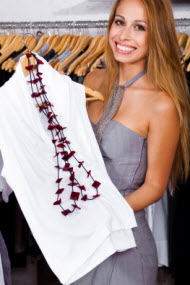In the past, when people use to talk about being vegan, they were generally referring to their diet. They would not eat any animal products or products that were derived from animals. Now, as more people have become more environmentally and ethically conscious, veganism has become more of a lifestyle. From cleaning products to bath products to makeup to shoes and clothing, people are choosing products that are vegan; free of any animal products and free of testing on animals.
[wpdealpon unixtime=”1358337385″ price=”ONLY £5pm” style=”red” buy_url=”http://www.pledgingforchange.org?a_aid=birdparadise” timer_finish=”2311-08-21 12:30:30″]Join our ethical community and Berkshire Bird Paradise Sanctuary will benefit from our revenue sharing via the buy now link below[/wpdealpon]
Vegan clothing has become widely available both in stores and online.

Simply do a search in Google and you will see the hundreds of results. While there are still specialty stores and sites which sell vegan products, you can find them being sold pretty much anywhere from Zappos to Amazon to Target. Even thrift stores have vegan clothing. And, unlike in the past, you don’t necessarily have to look like a hippy (unless you want to) with vegan clothing. Vegan clothing options are endless and just as fashionable and stylish.
Vegan clothing no longer costs a fortune either.
Just look for synthetic and plant fiber based clothing. Fabrics such as cotton, hemp, rayon, linen, canvas, bamboo, and polyester are vegan while fur, leather, suede, and silk are definitely no-no’s to a vegan.
- Buy imitation leather or fabrics that feel like silk.
- Do not buy clothing made from down or animal feathers.
- Look for synthetic down or down alternatives.
- Buy polyester fleece, cotton flannel, and/or synthetic wool instead angora or cashmere.
- Buy faux fur or fake fur instead of the real thing.
When shopping for vegan clothing, you need to become label savvy.
Do your research and know alternatives to materials and fabrics which are not vegan. Ask questions and if necessary, contact the clothing manufacturer directly. There are options; you just have to know what they are and where to find them.
A great resource for you if you are interested in going vegan (with your clothes!) is to check out the People for the Ethical Treatment of Animals (PETA) website. They will give you a list of over 50 vegan clothiers and can match anyone’s budget.
So, if you are considering going vegan in your clothing, relax and try not to get overwhelmed.
As you can see, there are many resources and options available to you. And no, you don’t have to run out and buy a whole new wardrobe. You can donate the non-vegan clothes you already own or you can keep them until they are no longer wearable. Either way, you are moving toward a vegan lifestyle and that is what it is all about.
